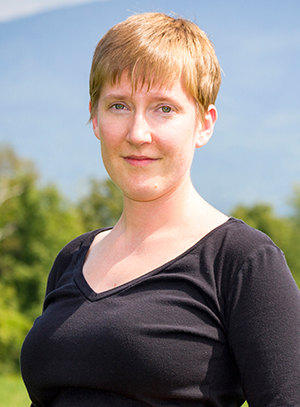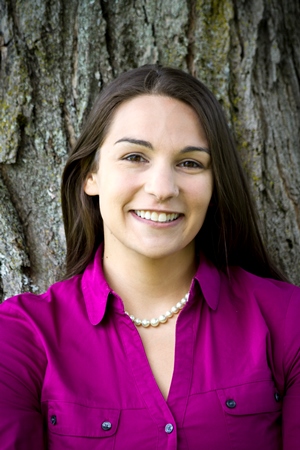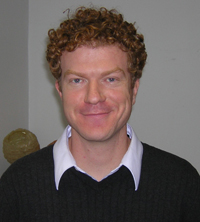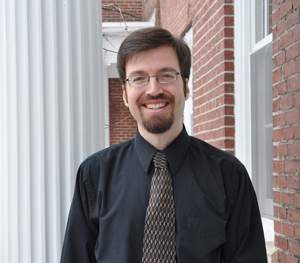
Colby-Sawyer College Faculty Present Research at Fall Colloquium Series
Colby-Sawyer College announces the Fall Faculty Colloquium Series, which will feature monthly research presentations by Colby-Sawyer faculty. The series is free, open to the public and begins Thursday, Sept. 25.
Jealousy and Self-Respect
Assistant Professor of Humanities Rachel Fredericks kicks off the series Thursday, Sept. 25, at 4 p.m. in Wheeler Hall at the Ware Student Center with “Jealousy and Self-Respect,” a response and criticism of the proposal that the emotion jealousy can help a person maintain, enhance, constitute, or signal a person's self-respect, and thus be a morally good thing. “I will focus on arguments for the claim that jealousy can help people protect the personal relationships that they value, and thus protect the basis of their self-respect, which is a morally good thing,” says Professor Fredericks. “I will talk about why I think that view is incorrect.”
Professor Fredericks encourages students and the community to attend the colloquium and learn more about her research specialty, a growing philosophical sub-discipline called moral psychology that focuses on the ethical significance of human beliefs, desires, emotions, and character traits. “Because these are things that we all have personal experience with, philosophical research on these topics is generally more interesting and accessible to a broader audience than some of the more abstract work that philosophers do,” she says. “I'm going to try to keep it light with some examples that are likely to be familiar to everybody. I'll also give a bit of historical background about this kind of research and why I find it so exciting.”
Professor Fredericks joined the faculty in 2013 with a Ph.D. and M.A. in philosophy from the University of Washington and a B.A. in philosophy from Reed College. She teaches courses in philosophy, focusing primarily in the various subfields of ethics, though she also enjoys teaching about philosophies of feminism and their relation to philosophies of race, class, and the like, the philosophy of mind, and ancient philosophy. Her research specialty is in moral psychology, and specifically the moral significance of emotions and interpersonal relationships such as friendship.

Opiate Addiction and Dependency in the U.S.
Assistant Professor of Social Sciences and Education Nicole Heller will lead the second colloquium on Thursday, Oct. 16, at 4 p.m. in Wheeler Hall. She will discuss the rise of prescription opiate painkillers (such as morphine, oxycotin, percocet and vicodin) addiction and dependence in the U.S., and how this rise has resulted in more people of child-bearing age having an opiate dependency as well as an increase of infants with prenatal opiate exposure. In addition to sharing reports from the Office of National Drug Control Policy and other agencies, Professor Heller will present her own research that explores the impact of prenatal opiate exposure on neonatal behaviors, and how those behaviors influence the maternal-infant attachment bond in the initial six months of life. “With regard to prenatal opiate exposure, a 2012 article from JAMA reported that 13,500 newborns every year experience opiate withdrawal in the United States, and that on average, the cost of treating each of these infants is $53,400, making the issue a public health concern,” says Professor Heller. “New England, including the state of New Hampshire, is also not immune to this epidemic, as rates of use and abuse continue to rise in this region.”
Professor Heller joined the faculty in 2013 with a Ph.D. from the University of Maine and a B.A. from Wittenberg University. Her research interests examine the synergistic impact of adverse prenatal environments and non-optimal postnatal environments on infant socio-emotional development, specifically, maternal-infant dyadic interactions.
W(h)ither Marx? Locating Marx in the New Millennium

Concluding the series, Associate Professor of Social Sciences and Education Eric Boyer and Associate Professor of Humanities Craig Greenman will lead the discussion “W(h)ither Marx? Locating Marx in the New Millennium” on Thursday, Nov. 13, at 4 p.m. in Wheeler Hall. During their interdisciplinary presentation Professors Boyer and Greenman will discuss the three-fold legacy of Marx and a theory of “trilateral materialism,” which situates Marx's dialectical materialism in an environmental context, and open the conversation to the audience. “Far from the 'end of history' that was promised in the waning years of the 20th Century, the 21st Century has instead been marked by political, economic, and social instability,” they argue. “We will each grapple with the relevance of Marx to the contemporary situation.”

Professor Boyer joined the Colby-Sawyer faculty in 2008. He earned a Ph.D. from the University of Minnesota and formerly served as a lecturer at the University of Minnesota and as an adjunct lecturer in the Department of Political Science at Saint Thomas University. His research interests encompass the history of political thought, political ideologies, American political thought, Marx and Marxism, democratic theory, comparative sociopolitical change, democratic transitions and African politics.
Professor Greenman joined the Colby-Sawyer faculty in 2004. He earned a Ph.D. from Loyola University of Chicago in 2002. Professor Greenman's teaching and research interests are grounded in contemporary continental philosophy and the history of philosophy, and include aesthetics, social and political philosophy, and applied and social ethics.
-Anurup Upadhyay '15
Anurup Upadhyay is a business major at Colby-Sawyer College and a student writer for College Communications.
Colby-Sawyer College is a comprehensive college that integrates the liberal arts and sciences with professional preparation. Founded in 1837, Colby-Sawyer is located in the scenic Lake Sunapee Region of central New Hampshire. Learn more about the college's vibrant teaching and learning community at www.colby-sawyer.edu.
Colby-Sawyer College, 541 Main Street, New London, N.H. 03257 (603) 526-3000


